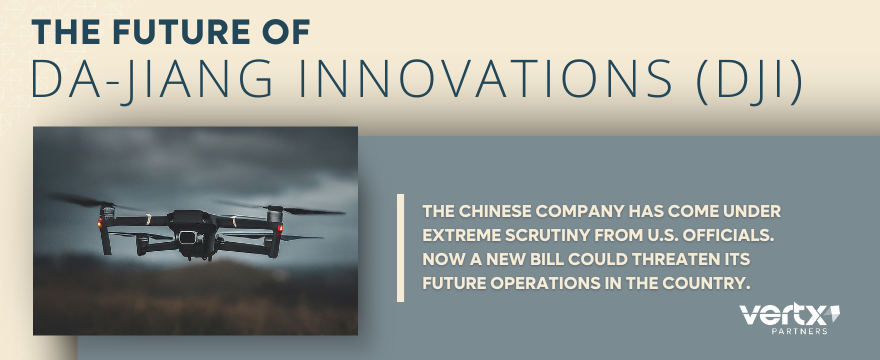The House of Representatives passed a new bill banning the world’s most popular drones. What happens if it passes the Senate?

***DISCLAIMER: This is an ongoing story. More details can be found here.***
Vertx Partners fosters an innovative Advanced Air Mobility (AAM) network in West Virginia and Appalachia. AAM starts small – literally – with drone usage.
The future of Da Jiang Innovations (DJI) drones in America is in danger. The Countering CCP Drones Act, introduced by Representative Elise Stefanik (R-NY), is gaining support in Congress, having passed the House of Representatives on June 14. If the bill passes the Senate and President Biden signs it into law, it could result in a nationwide DJI drone ban, impacting various sectors while opening opportunities for smaller drone manufacturers.
Why is Congress supporting this bill?
Legislative Efforts & National Security Concerns
The Countering CCP Drones Act is trickling through Congress after receiving unanimous approval from the House Energy and Commerce Committee. If passed, the bill would add DJI to a list maintained by the Federal Communications Commission (FCC) under the Secure and Trusted Communications Networks Act of 2019. This designation would block DJI drones from using U.S. communications infrastructure, effectively rendering them inoperable.
Proponents of the bill cite national security concerns, alleging that DJI drones provide data on critical American infrastructure to the Chinese Communist Party (CCP). The problem is that adversaries may use Chinese technology, including DJI drones, for espionage and other activities compromising U.S. security.
How would this bill impact the industry?
Impact on the Drone Market and Consumers
DJI has solidified its position as the leading global manufacturer of consumer drones, with an estimated 58% market share as of 2022 (according to The New York Times).
The company’s drones are popular due to their affordability, accessibility, and advanced features, making them a favorite among hobbyists and professionals alike. Professionals in industries such as construction, energy, and agriculture use DJI drones extensively. They also operate in public safety initiatives, like search and rescue missions, for locating missing persons.
(Prior Vertx Guides, like this one, have explored how drones are crucial to first responders and other professionals.)
A ban on DJI drones would significantly disrupt the ability of these industries to function as they are. Consumers and businesses that rely on DJI products for aerial photography, land surveying, infrastructure inspection, and other applications would need to seek alternatives. This transition could be costly and time-consuming, potentially hindering operations and projects.
“A nationwide ban on the leading global manufacturer of consumer drones might slow down AAM efforts in the country,” says Vertx President Sean Frisbee. “However, the ban would offer opportunities by creating various niches consumers would be desperate to have filled.”
Opportunities for Smaller Drone Manufacturers
While the potential ban on DJI drones poses challenges, it also allows smaller and domestic drone manufacturers to fill the gap.
Modal AI lists 60+ American drone manufacturers that supply products for consumer, commercial, and military purposes. These companies are well-positioned to capitalize on a potential market shift. Current consumers may flock to them if DJI drones are banned.
In the event of a ban, a more competitive drone market might emerge, fostering innovation and leading to the development of new features and technologies. With increased investment in domestic drone manufacturing, the U.S. could reduce its reliance on foreign technology, enhancing national security.
“This story is of special interest to Vertx because of the intersection of national security interests and AAM efforts,” says Vertx VP of Operations Mary Cook. “If domestic manufacturers can clear the gap left by DJI’s absence, we may have the best of both worlds.”
DJI’s Response & Lobbying Efforts
However, the ban is not yet set in stone. In addition to a potential veto in the Senate, DJI isn’t going down without a fight.
In response to the proposed ban, DJI launched significant lobbying efforts and sought grassroots support from drone operators. The company argues that the allegations against it are unfounded and that a ban would stifle competition and innovation. DJI continues to emphasize its commitment to following market regulations, providing options for users to ensure data security, such as opting out of data collection features and enabling Local Data Mode.
In addition to funding the Drone Advocacy Alliance, DJI penned a blog post titled “Get The Facts” that refutes many of the allegations made by proponents of the Countering CCP Drones Act.
Conclusion
The potential ban on DJI drones under the Countering CCP Drones Act represents a critical juncture for the U.S. drone market.
While the ban aims to address national security concerns, it would disrupt various sectors that rely on DJI technology. However, it also allows domestic drone manufacturers to rise and innovate. This could potentially lead to a more secure and self-reliant industry.
“All eyes should be on whether the Countering CCP Drones Act gets through the Senate,” says Sean Frisbee. “If it does, things will get very interesting for America’s AAM industry.”
As the bill progresses through Congress, stakeholders in the drone industry will need to stay informed and prepared for potential changes. The outcome will have significant implications not only for DJI but for the broader landscape of drone technology and its applications in the U.S.
Vertx Partners remains committed to ensuring its readers are updated on the latest AAM news. As this story develops, check back for updates and the latest analysis by the Vertx team.









